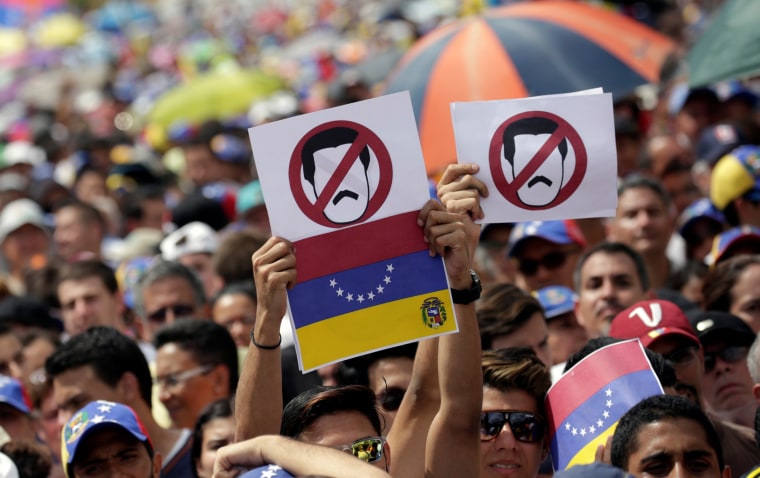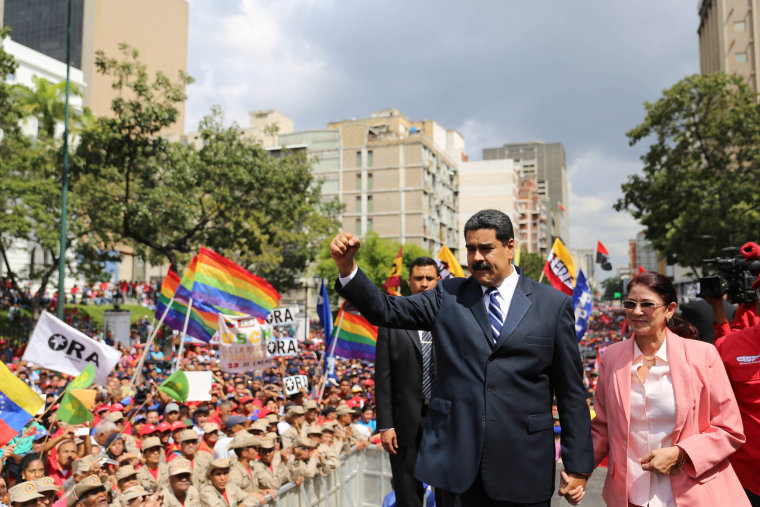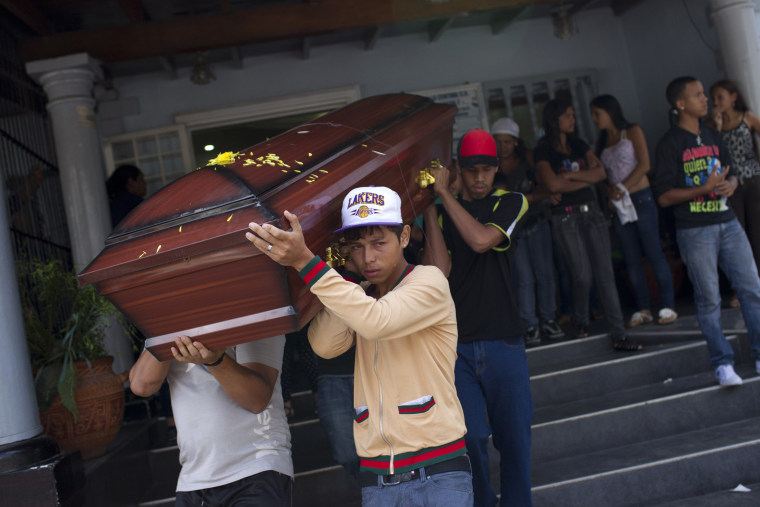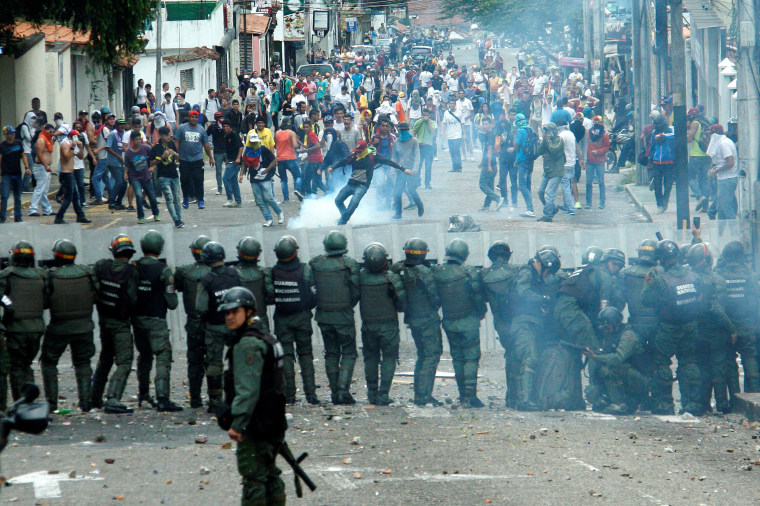During the boom years of the 2000s, Venezuela reaped a windfall from its oil production. There was enough wealth — heavily controlled by the government — to pay for social programs and education, and cut poverty rates by more than half.
Even the United States — whose relationship with the Latin-American nation was icy at best under the late socialist leader Hugo Chávez — could be counted on as Venezuela's biggest customer.
No longer. Venezuela is a country in crisis.

Tanking oil prices and failed economic policies led to bare shelves at supermarkets, a shortage of medical supplies, unbridled hyperinflation and an infant mortality rate so high it surpasses even that of war-torn Syria.
PHOTOS: Massive Demonstrations Demand President's Ouster in Venezuela
As anti-government protesters called for a general strike Friday against leftist President Nicolás Maduro — with more demonstrations promised — a power struggle is playing out among political factions that could ultimately plunge Venezuela into social chaos and economic collapse, and requiring more forceful international intervention, observers say.
Here are five major reasons why hundreds of thousands of Venezuelans continue to pour into the streets in anger:
1. They're worried Maduro is replacing democracy with a de facto dictatorship.
Maduro was elected to office after the death of Chávez in 2013. His term was met with increasing resistance as consumer prices soared, and in 2014, street protests against his administration turned deadly.
Since then, critics have charged Maduro with inching closer toward dictatorial rule by suppressing people's rights and arresting political enemies.
"Maduro has shown how scared he is that the people will express themselves," opposition leader Henrique Capriles told The Associated Press as the nation was roiled by protests Wednesday.

2. A recall effort to oust Maduro was suspended by election officials.
Some lawmakers in Venezuela's National Assembly have pushed for a recall vote to get Maduro out of office. His term expires in April 2019.
But the country's electoral commission suspended the referendum drive last week after Maduro denounced it as a coup attempt.
In response, protesters and political adversaries have called for Maduro to be placed on trial for supposedly snubbing the country's constitution, which allows for recall elections. Protesters plan a major demonstration next Thursday at the presidential palace in Caracas if "constitutional order" is not restored.
3. The country, in a third year of a brutal recession, has grappled with food and supply shortages.
One of the more startling fallouts from the economic recession has been images of Venezuelans storming store shelves and mobs ripping open food delivery trucks in search of supplies.
Three years ago, as the class divide grew deeper, the crisis grabbed international headlines when people said they had to go to neighboring countries just to procure toilet paper.
More recently, "perhaps gearing up for a potential recall referendum," the government has reinvested in importing necessities, said Alejandro Velasco, the author of "Barrio Rising: Urban Popular Politics and the Making of Modern Venezuela."
"I can go to a store now and find most products I want, even if it's not the variety I want," Velasco told NBC News on Friday from Caracas.
Velasco has been living in the capital while on sabbatical from New York University, where he teaches modern Latin American history. He said the government has all but given up on regulating prices — with "enormous inflation" affecting even the middle and upper classes that have the access to cash.
"For poorer sectors of Venezuela, which comprise the majority of the population, they're of course getting hammered," Velasco said.
The lack of resources also extends to infrastructure, from dilapidated roads to burned-out lampposts to degraded conditions at hospitals.
"And all of it masked and made worse by consistent claims on the part of the government especially, but also of the opposition, that things are either much better than they are — says the government — or that the opposition is much more united and determined than it is — says [opposition] leaders — when in fact neither is true, and demonstrably so," Velasco added.
4. Oil prices have tanked, and $11 billion went missing from the state-run oil fund.
Venezuela has been an oil producer since 1914, and eventually amassed the world's largest oil reserves. But as Chavez was able to capitalize on soaring oil prices into the late 2000s, the nation's fortunes went bust when prices began to plummet and its economic policies unraveled.
This month, a new scandal emerged when a congressional commission said Petróleos de Venezuela, the country's state oil company, could not account for $11 billion in funds during 2004 to 2014.
The company has long been accused of corruption, including a $1 billion kickback scheme with ties to American businessmen, Reuters reported.
The congressional probe is now stalled after Venezuela's top court ordered an injunction Thursday to block further investigation.
5. Poor quality of life — from crime to poverty — has spiraled out of control.
Street gangs and organized crime run rampant in Venezuela, making it one of the deadliest in the world last year, according to the U.S. State Department's Overseas Security Advisory Council.
The think tank Observatory of Venezuelan Violence said homicides were at 90 per 100,000 people — on par with other Latin-American countries plagued by killings. The U.S.'s homicide rate is about 5 per 100,000.

To improve quality of life and boost people's households, Maduro said Thursday he would sign a 40 percent rise of the national minimum wage.
Whether that can assuage the growing tide of frustration aimed at the government is unlikely, observers say.
Velasco said among community activists there remains a feeling of "a la deriva" — or being adrift — "at sea, alone, frightened, upset and with little expectation that anything will change anytime soon."
When he went to an opposition protest recently to observe, he noted something else: a sense of confusion and disorder as they strategized and "debated among themselves."
"It's the way of Venezuelan politics, ad hoc, never planning beyond short term," he said, "and always as a result, suffering the consequences."

